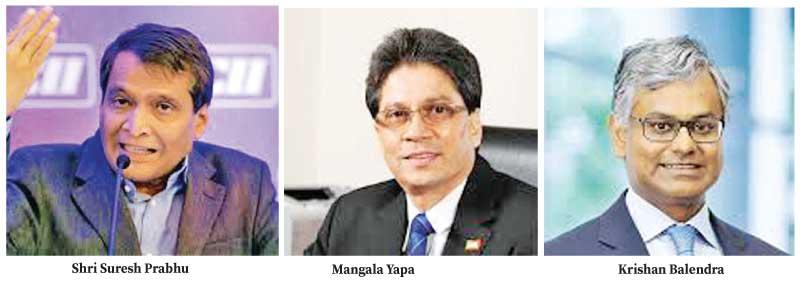
Sri Lanka’s renewable energy sector has the potential to attract around US$ 50 billion in Foreign Direct Investments (FDI) from India which will boot the energy sector and spur economic growth in Sri Lanka, former Minister of Commerce and Industry and Civil Aviation of India and the official emissary of the Prime Minister of India in the G7 and G20 forum, Shri Suresh Prabhu told the 19th Sri Lanka Economic Summit last week.
It was organised by the Ceylon Chamber of Commerce.
He said India has to pay large amounts as royalty to import energy from Bhutan which has a well developed renewable energy sector.
“Sri Lanka has great win-win potential which could produce much more energy than a wind farm in India. If a wind farm has the potential to produce 50 percent wind energy, Sri Lanka could produce 40,000 to 50,000 MW and export to India bringing in foreign exchange to the country,” Prabhu said.
India purchases surplus power from Bhutan. An Indian energy company purchased recently from the Bhutan state-run Druk Green Power Corp. Ltd, which runs the 720 megawatts (MW) Mangdechhu hydropower project.
“Sri Lanka has the potential in many ways, but strategies for economic growth should not disturb what it has, particularly the natural beauty and for Sri Lanka to develop, it has to preserve its natural and invaluable human capital,” Prabhu said, adding that each country will need to think how it could address supply chain disruptions putting aside what was learnt in the past and to come up with new strategies that will be sustainable.
The former minister also said India is working on an ambitious plan to transform the country to a US$ five trillion economy in seven years and a US$ 10 trillion economy in 15 years.
The Indian Premier said that he wanted India to be a $5-trillion economy by 2024. Currently, India is a $2.8-trillion economy and to reach the $5-trillion mark by 2024, the economy would require growth of over 12 percent a year.
“Sri Lanka is a valued partner for India whose growth will benefit Sri Lanka. We need to find strategies to work that out through the industry, services sector which Sri Lanka is a great country for and the agriculture sector.
“I am happy to speak about Sri Lanka because it is the country I love and wanted to visit for the past five years. Sri Lanka must leverage on its unique and strategic location to export to other countries in the region,” The former minister said.
However, he noted that disruptions to economies will be intensified by geo-politics that will affect geo-economics.
“When the domestic economy slowsdown, we blame those around. Each country will have to find strategies which cannot be static but dynamic. Sri Lank has a bright future and it is poised for economic growth because of its rich human capital and natural beauty,” Prabhu said.
John Keells Holding Chairman Krishan Balendra said the tourism industry which was affected by the Easter Sunday attacks is on a fast recovery path with the number of arrivals increasing at a pace faster than expected.
“We have seen a month on month increase in the number of visitors since May and with the Winter season round the corner, arrivals will be at a higher rate,” Balendra said, adding that achieving two million is not something that the country could crow about when compared to Thailand, Malaysia, Vietnam and Indonesia.
However, he said global events will not have a major impact on the tourism sector unless they are large enough to cause a huge damage to the industry.
Board of Investment of Sri Lanka (BOI) Chairman Mangala Yapa said the country needs to be branded in areas that could attract FDIs. Sri Lanka is known for investments, but not necessarily for the right reasons. Investors ask about the safety in the country.
“Our port sector is one of the best in the region. Its performance over the years has been remarkable. It is cheap for some parts of India to import from Sri Lanka than source it from India itself. Infrastructure is in place, but needs improvement. Liberalisation is crucial to develop the ports and shipping sector,” Yapa said, adding that the number of free trade zones must be increased with more space in zones.
